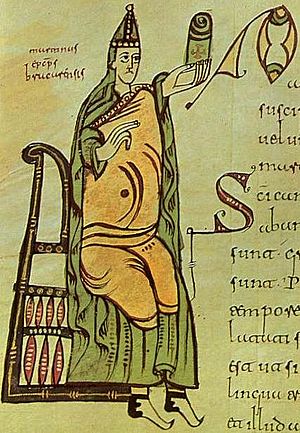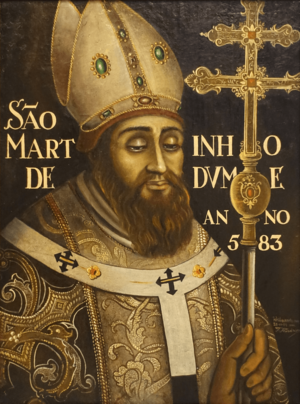Martin of Braga facts for kids
Quick facts for kids SaintMartin of Braga |
|
|---|---|

Image of Saint Martin of Braga in a 10th-century manuscript.
|
|
| Born | c. 520 Pannonia |
| Died | 580 (age 60) |
| Venerated in | Catholic Church Orthodox Church |
| Feast | 20 March |
Martin of Braga (also known as Martinho de Dume in Portuguese) was an important religious leader who lived from about 520 to 580 AD. He was an archbishop (a high-ranking bishop) in a place called Bracara Augusta, which is now Braga in Portugal.
Martin was a missionary, meaning he traveled to spread his religious beliefs. He also started monasteries, which are places where monks live and worship. He wrote many important religious books and letters. People at the time said he was very wise and learned. He was later recognized as a saint in both the Catholic Church and the Eastern Orthodox Church. This was because he helped many people in a region called Gallaecia (now parts of Spain and Portugal) change their beliefs to Chalcedonian Christianity. His special day is celebrated on March 20.
Contents
Martin's Early Life and Travels
Martin was born in a region called Pannonia, which is in Central Europe. When he was older, he went on a long journey to the Holy Land, a very important religious place. There, he became a monk, someone who dedicates their life to religious practice.
Later, Martin traveled to a part of Europe called Hispania. He decided to live in Gallaecia. We don't know exactly why he chose such a faraway place. However, his arrival there was very important for history.
Converting the Suevi People
Martin played a big role in helping the Suevi people change their religious beliefs. The Suevi were a Germanic group who lived in Gallaecia. They followed a different type of Christianity called Arianism. Martin helped them convert to Chalcedonian Christianity, which was the belief of their king, Rechiar, in the 400s.
While in Gallaecia, Martin started several monasteries. The most famous one was at Dumium. Around the year 550, he became a bishop of Dumium. This is why he is sometimes called "Martin of Dumium."
Martin's Role in Church Councils
In May 561, Martin attended an important church meeting called the First Council of Braga. He was there as the bishop of Dumium. Later, in 572, he led another meeting called the Second Council of Braga. By this time, he had become the archbishop of Braga, which is an even higher position. Martin wrote many of the rules and decisions made at these councils.
Martin's Writings and Ideas
Martin of Braga wrote many books and letters. He was a very active writer.
Books on Morals and Life
Martin wrote two very interesting books in the last ten years of his life. These were called De ira (On Anger) and Formula vitae honestae (Rules for an Honest Life). These books were based on older writings by a famous Roman philosopher named Seneca the Younger. Seneca's original works were lost, so Martin's versions are very valuable today. They show that some of Seneca's ideas were still known in Martin's time.
Martin also wrote three shorter essays about good behavior. These showed he knew the works of another important writer named John Cassian.
- Formula vitae honestae (Rules for an Honest Life): This book was written for Miro, who was the king of the Suevi. For a long time, people thought this book was written by Seneca himself. This happened because the part that said Martin wrote it was accidentally lost. Because of this, people mistakenly used it to argue that Seneca was a Christian.
- De ira (On Anger): This book was also based on a work by Seneca.
- Three essays on vices: These essays talked about bad habits like showing off (Vanity) and being too proud (Pride).
- Pro repellenda jactantia (Driving Away Vanity)
- De superbia (On Pride)
- Exhortatio humilitatis (Exhortation to Humility)
Church Rules and Calculations
Martin also helped create rules for the church.
- Canons of St. Martin: These were 84 rules that Martin translated from Greek and Egyptian church laws. They were added to the decisions of the Second Council of Braga.
- De Pascha (On Easter): This work explained how to figure out the date of Easter. Martin said Easter should be between March 22 and April 21. He also said the date should be announced early so people would know when Lent (a period of fasting) would begin.
Other Important Writings
- De correctione rusticorum (On the Reform of Rustics): This was a sermon (a religious speech) written as a letter to another bishop. It talked about how to help people in the countryside who still followed old pagan beliefs.
- De trina mersione (On Triple Immersion): In this letter, Martin wrote about how baptism should be done. He disagreed with the Arian practice of baptizing people in the three names of the Trinity separately. He said the correct way was to do a triple immersion (dipping three times) in the single name of the Trinity.
- Sententiae Patrum Aegyptiorum (Sayings of the Egyptian Fathers): Martin translated this collection of wise sayings from an old Greek book. He removed some stories about the daily lives of the monks to focus more on their moral lessons.
- Poetry: Only three of Martin's poems still exist today. Two are inscriptions for buildings, and one is a short poem about his own life.
Martin's Work Against Paganism
In 572, the Second Council of Braga decided that bishops should gather people to help them become Christians. After this meeting, a bishop named Polemius asked Martin for advice on converting people in rural areas who still held pagan beliefs. Polemius was worried about their worship of idols and other practices. Martin replied with a sermon, which was included in his letter to Polemius.
This sermon, called De correctione rusticorum (On the Reform of Rustics), is very interesting to scholars today. It lists many pagan practices from the 500s in Iberia. What's special is that Martin's approach to these practices was quite understanding. Some historians believe this was because of his education and the influence of philosophers like Seneca and Plato.
Martin had traveled east around 550, possibly to avoid strict religious rules in Rome. At that time, the emperor Justinian I was trying to unite the Roman Empire under one faith. Martin chose a gentler way to convert the Suevi people in Gallaecia. He preferred to persuade them rather than force them to change. He even wrote his sermon in a simple, everyday style of Latin, using local words.
Changing the Names of the Days of the Week
Martin also disagreed with the custom of naming the days of the week after pagan gods (like Mars, Mercury, Jupiter). Because of his influence, Portuguese and Galician are the only Romance languages that name their days of the week using numbers and Catholic church terms, instead of pagan gods. For example, Monday is "second fair" (segunda-feira) instead of "Moon day."
See also
 In Spanish: Martín de Braga para niños
In Spanish: Martín de Braga para niños
 | Kyle Baker |
 | Joseph Yoakum |
 | Laura Wheeler Waring |
 | Henry Ossawa Tanner |


